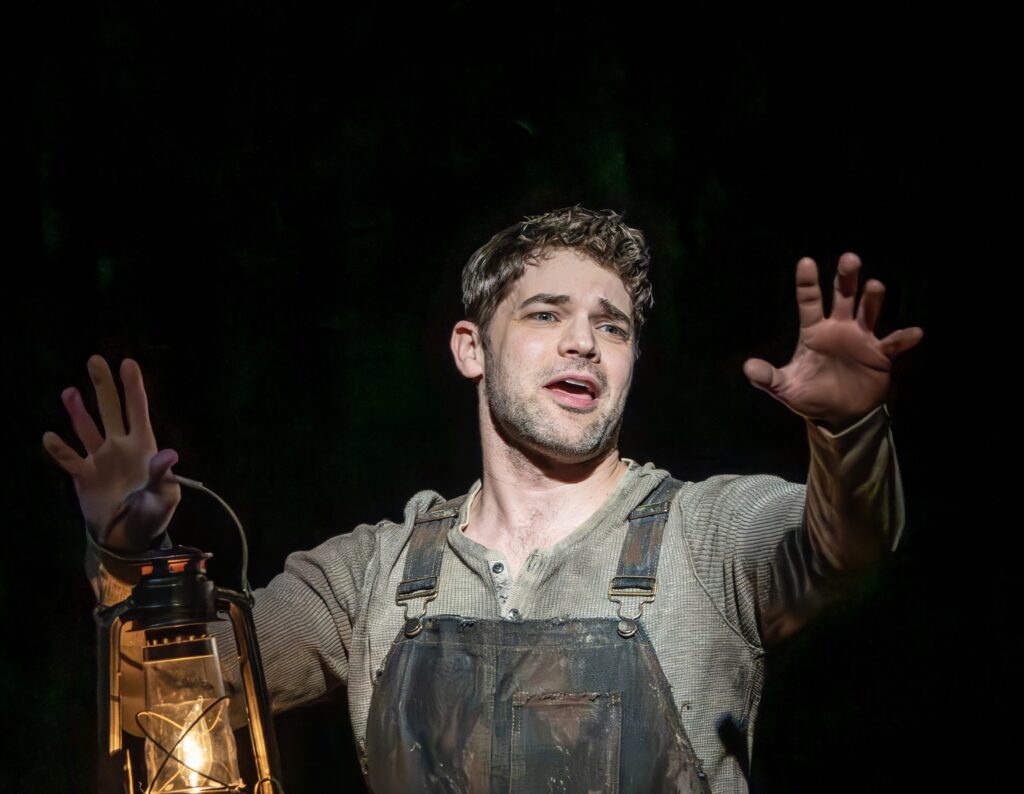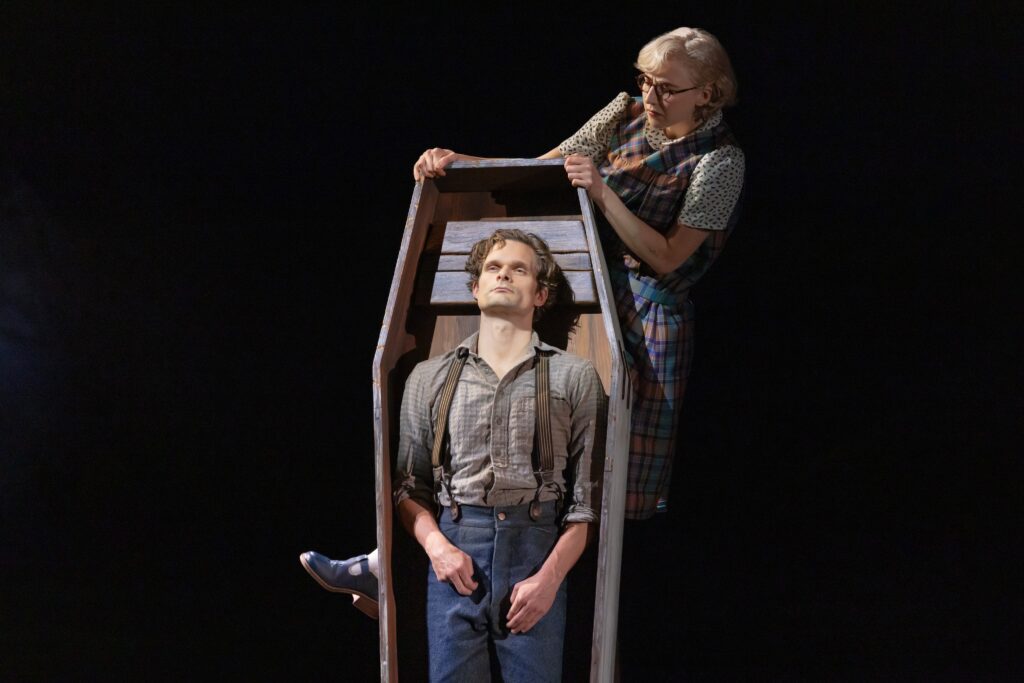VIEWPOINTS – Chasing the American Dream and the Great American Musical: DEAD OUTLAW and FLOYD COLLINS open on Broadway
- By drediman
- April 28, 2025
- No Comments
Over the past few days, I was able to catch — in quick succession — two musicals on Broadway that share more than a passing trait or two, namely with respect to their depiction of the often ungainly pursuit of the American Dream. These would be the Main Stem transfer of Dead Outlaw and the long-awaited return to the New York stage of Floyd Collins — both of which, in their own way, also make a claim as a Great American Musical. As per usual, read on for my thoughts.
DEAD OUTLAW
Longacre Theatre
Open run
Last night, the uptown transfer of the much awarded Off-Broadway musical Dead Outlaw opened at the Longacre Theatre (HIGHLY RECOMMENDED). Based on an unlikely true story, the musical chronicles the life and “afterlife” of one Elmer McCurdy, a restless young man whose numerous pursuits at outlaw-hood are met with invariable failure. As such, it isn’t surprising that about halfway through the show, the character is killed off in a shoot-off with the authorities. From there, the show takes a wild turn, following McCurdy’s corpse as it’s passed from hand to hand through much of the 20th century, making the bleakly absurd point that the failed outlaw was worth more dead than alive in the eyes of America and the systems by which it abides. Featuring a rollicking score by David Yazbek (with the help of fellow bandmate Erik Della Penna), whose spirited nods to Americana lend the production a sturdy sense of time and place, and a freewheeling book by Itamar Moses that’s as artful as it is playfully cynical, Dead Outlaw is at first glance an unlikely successor to the calmly rhapsodic The Band’s Visit. But look more closely, and you’ll find the kind of subtlety and thoughtful theater-making that distinguished the collaborators’ previous Tony-winning effort. On its trip to the Great White Way, director David Cromer’s organic, ever-morphing production has been tightened and enhanced, particularly the evocative lighting design by Heather Gilbert and the nuanced sound design by Kai Harada (the production was originally an Audible presentation, after all). Although a rock band — led raucously by cx, who also serves as the show’s narrator — features centrally in the staging, the presentation ultimately veers more towards a vaudevillian sensibility in the way it gives most members of the sensational cast time to shine in the spotlight, starting with Andrew Durand, whose perfectly calibrated leading performance as McCurdy achieves a level moral ambiguity that’s both unnerving yet oh-so-entertaining.

FLOYD COLLINS
Lincoln Center Theater at the Vivian Beaumont Theater
Open run
Then we have the anticipated Broadway premiere of Adam Guettel and Tina Landau’s musical Floyd Collins (HIGHLY RECOMMENDED), which opened this past week at the Vivian Beaumont Theater courtesy of Lincoln Center Theater. Just like Dead Outlaw, the 1996 musical is an unlikely subject for a musical — a retelling of the 1925 incident in which a man (the titular Floyd Collins) is trapped and dies in a Kentucky cave, which is met by a media circus that commodifies the tragedy. First and foremost, the folk-tinged score sounds simply sublime, and it’s clear that much effort has been put in by all involved to make this perhaps the definitive rendition of Guettel’s nearly 30-year-old composition (I for one cannot wait for the cast album). Indeed, each song seems newly calibrated to each character’s emotional journey in the show, bringing with it new and often illuminating ways of approaching the swoon-worthy score. Just as Guettel and original music director Ted Sperling have spent time refining the score, Landau and her team bring maturity and intent to the staging. Take for instance two exquisitely wielded design elements, Dan Moses Schreier’s sound and Scott Zielinski’s lighting (both creatives are also holdovers from the 1996 production). In the ravishingly-staged number “The Call” that introduces us to Floyd Collins early in the show, the cavernous Beaumont auditorium becomes a dazzling but menacing chamber of possibilities, both in terms of the song’s sonic echoing resonance, as well as the abyss-like darkness in which in which Collins’ unknown destiny lays. For the most part, Landau’s staging takes place on a bare stage, with just a few simple scenic strokes to evoke setting. Jeremy Jordan is perfectly cast in the title role and gives a career-defining performance that’s especially transcendent during the liminal moments between life and death. Suffice to say, he brings a defiant and exuberant spirit to the role and sings like an absolute dream. Trent Trensch is also a standout, imbuing the role of a young reporter who befriends Floyd with ample specificity and real urgency. Also terrific — particularly in the vocal department — are Jason Gotay and Lizzy McAlpine as the doomed cave explorer’s disillusioned brother and dreamy sister. Also quite fine are Sean Allan Krill, Marc Kudisch, and Jessica Malarkey, all of whom give finely-etched performances, enriching the tapestry of this modern classic.


 Copyright © 2025
Copyright © 2025
Leave a Reply